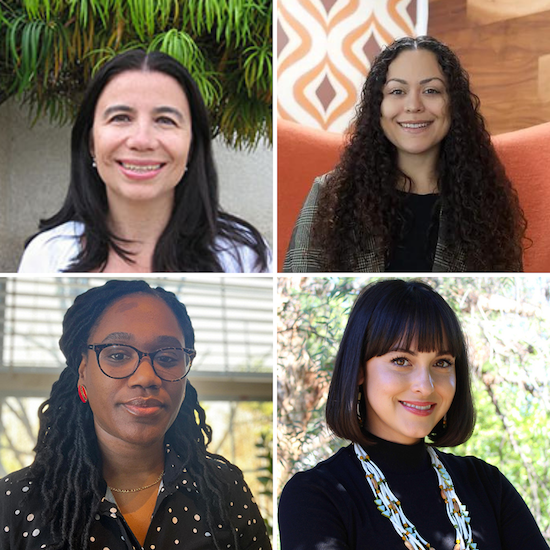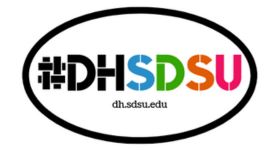The Digital Ethnic Studies Interdisciplinary Research Cluster is a two-year pilot funded through the SDSU College of Arts and Letters in Academic Years 2022-23 and 2023-24. It includes faculty from Africana Studies, American Indian Studies, Asian American Studies, Chicana and Chicano Studies, and the Digital Humanities Center.
Our vision with this interdisciplinary research cluster is to intentionally develop Digital Ethnic Studies at SDSU through sustainable partnerships and decolonial methodologies. The motivation for this cluster builds upon three lines of thinking. First is the recognition that Ethnic Studies disciplines have always already been concerned with the digital, raising questions about people of color and their varying relationships to technological advancements, moments, platforms, and dialogues. Africana Studies, for example, has historically imagined itself to be interested in a central and critical way with forward movements in science and technology. In the late 1960s when Nathan Hare designed the blueprint for Black Studies curriculum, he imagined a “science and technology” track similar to the “Arts” and “Behavioral and Social Sciences” concentrations (1972). He even listed “Black Science” as a core course in Black Studies. While the “science and technology” track is yet to be fully formed, since the late 1960s, the discipline has evolved to include digital content through research projects, journals, and so forth. Similarly, Asian American Studies has long been engaging the digital and technological as well as its unseen politics while being marginalized in the definition of a canonical Digital Humanities. Lisa Nakamura has been writing about race and the digital since the 1990s. AsianAmerica.Net is a text published in 2003 that brought together a range of Asian Americanists working in information technologies. A key project of American Indian Studies’s effort to decolonize the academy is the recognition of the value of Indigenous forms of knowledge. Indeed, one of Vine Deloria’s (1969, 1995) central critiques of the academy was that Native knowledge of and interactions with the natural world should be studied as Indigenous science and technology. Additionally, the work of language revitalization and rebirth (a central focus in American Indian Studies and within nearly all Indigenous communities) has become inherently a digital humanities project utilizing technology and DH pedagogies to create dynamic and interactive archives and teaching materials to aid in the rebirth of language use. And, digital humanists in Latinx Studies and Borderlands DH seek to elevate histories that have been categorically left out of US canonical narratives, to build digital solidarities with public access at the center,, and to put into practice an ethic of care when dealing with data.
Complementing these disciplinary histories, a parallel impulse is SDSU’s DH initiative which “takes a critical stance towards digital technology and focuses its work on equity, diversity, inclusion, and social justice. As the hub of that work, the DH Center supports anti-racist and anti-oppressive research, teaching, and learning that values the importance of the humanities, and the interactions of humans in real time and space, in the digital age.” In conceiving of an intersection between DH and the Ethnic Studies disciplines at SDSU, third and finally, we consider important Roopika Risam’s (a PI for DEFCon, a digital humanities research and teaching community for Ethnic Studies fields) argument that the core responsibility of the Digital Humanities is to build an equitable digital cultural record, thinking critically about how minoritized communities are implicated by the digital.
Cluster Goals
- Connect faculty from the distinct Ethnic Studies departments to a range of scholars, practitioners, and scholarship at the intersection of DH and Ethnic Studies disciplines.
- Develop, through the DH Center, needs-based training opportunities for faculty from the distinct Ethnic Studies departments in the use of DH tools, techniques, and platforms towards research visualization and dissemination.
- Foster cross-unit intellectual exchange and collaboration between faculty from the distinct Ethnic Studies departments.
- Facilitate conversations between the DH Center, Ethnic Studies faculty and the communities they already work in to determine usefulness of DH technologies towards addressing community needs and respectfully protecting indigenous and community-based epistemologies.
Objectives
- Host a reading group for faculty from the distinct Ethnic Studies departments that focuses on the intersection between DH and Ethnic Studies disciplines.
- Host a speaker series for Ethnic Studies faculty to introduce scholars and practitioners in Digital Ethnic Studies and establish networking opportunities.
- Develop tailored training for Ethnic Studies faculty in digital storytelling tools such as podcasting and story mapping towards the creation of, for example, digitally curated and preserved oral histories, digital archives.
- Host a one-day “Digital Ethnic Studies in the Community” symposium to learn, exchange, and highlight community-based practitioners employing DH methods, tools, and technologies in their activism and creative activities, thereby establishing and strengthening relationships between Ethnic Studies faculty, the DH Center, the College of Arts and Letters, and the wider community.
Desired Outcomes
- Increase familiarity with, fluency, and comfortability using DH tools among Ethnic Studies faculty.
- Increase visibility of Ethnic Studies faculty research and scholarship at the college-level and more broadly.
- Establish relationships and partnerships between Ethnic Studies faculty, DH Initiative, DH Center, and communities represented by Ethnic Studies faculty.
- Establish important collaborative relationships across rank between individual Ethnic Studies units.
- Bring DH approaches and tools into the undergraduate curriculum of the distinct departments that make Ethnic Studies at SDSU.
- Enhance collaborations with community-based entities who seek DH tools and technologies.
Explore our public-facing events
Meet our 2023-2024 seed grant recipients
The College of Arts and Letters Digital Ethnic Studies Interdisciplinary Research Cluster awarded four faculty $2000 each to seed DH-inflected instructional projects in AY 2023-24.

Dr. Victoria González-Rivera, Associate Professor in Chicana and Chicano Studies, will incorporate a Wikipedia entry assignment focused on creating biographies of the men and women who joined the white filibuster William Walker in the 1855 takeover of Nicaragua in her course, “CCS 141A U.S. History from a Chicano/a Perspective” in Fall 2024. Students will engage with the history of enslavement in the U.S. and its relationship to Manifest Destiny and continental imperialism.
Dr. Natalie Santizo, assistant professor in Chicana and Chicano Studies, will integrate a digital mapping assignment using ArcGIS StoryMaps to interrogate how foodways shape racial formations and spatial inequalities in the US in her course, “CCS 325: Latinx Foodways” in Fall 2024.
Dr. Charmane M. Perry, assistant professor in Africana Studies, explains, “In my course, AFRAS 470. Comparative History: Afro-American and African Heritage, we examine practices of African culture and heritage in the African diaspora particularly the United States, the Caribbean, Central and South America. Because enslaved Africans brought to the Americas retained their African culture, African heritage remains fluid and present in the African diaspora through cultural institutions such as food, religion, music, dance, language, family, and traditions. With the Digital Ethnic Studies Seed Grant in mind, students have been working on a ‘creative project’ of their choice, having identified an area and cultural institution of the African diaspora. For example, Kemiah Williamson is examining African American Vernacular English and plans to explore it through poetry and spoken word. Two students, Klarke Pipkin and Sydney Cummings, are looking at African American culinary practices in the deep south and New Orleans and plan to develop a cookbook containing not only recipes but the history/roots of the dishes. And Ikechi Elendu is examining the impact of Black fashion in the Black Mecca, Harlem, from the Harlem Renaissance to the early 21st century and plans to use her journalism background to create a Zine to explore the topic. I will be using some of the funds from the grant to hire a website designer so that their projects can be placed in the digital world and accessible beyond their classmates and myself. My goal is to continue to add to the website each semester I teach this course with the possibility of adding other courses to this digital exploration of the African diaspora.”
Dr. Olivia Chilcote, assistant professor in American Indian Studies, shares: “When you think of San Diego, Los Angeles, or Sacramento, do you automatically consider them Indigenous spaces? In AMIND 420: Indian Peoples of California, Dr. Olivia Chilcote’s students are working to reorient dominant understandings of place through a California Indian lens. Students in AMIND 420 have met at the Digital Humanities Center throughout the semester to create ArcGIS StoryMaps for a final “California Native Spaces Digital Mapping Project” funded by a Digital Ethnic Studies Seed Grant. Drawing on the course text, We Are the Land: A History of Native California by Damon Akins and William Bauer Jr. (Round Valley Indian Tribes), student projects highlight the centrality of California Indian presence throughout the state and beyond. Using maps, images, text, and other forms of audiovisual content, students deepen their own perceptions of California as inherently Indigenous while they learn digital narrative tools to represent California Indians’ enduring connections to land.”
Abbreviated Reading List
Arriaga, E., & Villar, A. (2021). Afro-Latinx Digital Connections. University Press of Florida.
Brown, S. Dark Matters: On the Surveillance of Blackness. Durham, NC: Duke University Press, 2015.
Byrd, Jodi A. “Tribal 2.0: Digital Natives, Political Players, and the Power of Stories.” Studies in American Indian Literatures 26, no. 2 (2014): 55–64. https://doi.org/10.5250/studamerindilite.26.2.0055.
Benjamin, Ruha. Race After Technology: Abolitionist Tools for the New Jim Code. Wiley, 2019. Full text available through SDSU Library.
Chun, Wendy. Discriminating Data: Correlation, Neighborhoods, and the New Politics of Recognition. MA: MIT Press, 2021.
Costanza-Chock, Sasha. Design Justice: Community-Led Practices to Build the Worlds We Need. MA: MIT Press, 2020. Open access version available.
Cotera, M. (2018). “Nuestra Autohistoria: Toward a Chicana Digital Praxis.” American Quarterly, 70(3), 483-504. https://doi.org/10.1353/aq.2018.0032.
Kim, Dorothy and Adeline Koh, eds. Alternative Historiographies of the Digital Humanities. Punctum Books, 2021. Free e-book available.
Kreitz, K. (2017). “Toward a Latinx digital humanities pedagogy: remixing, reassembling, and reimagining the archive.” Educational Media International, 54(4), 304-316.
Noble, Safiya Umoja. Algorithms of Oppression: How Search Engines Reinforce Racism. New York: NYU Press, 2018. Library has print and e-version
Risam, Roopika and Kelly Baker Josephs, eds., The Digital Black Atlantic: Exploring the Intersections of Digital Humanities and African Diaspora Studies. Minnesota University Press, 2021. Open access version available.
Risam, Roopika. New Digital Worlds : Postcolonial Digital Humanities in Theory, Praxis, and Pedagogy. Evanston, Illinois: Northwestern University Press, 2019.
SDSU Digital Humanities Library Guide
Steele, Catherine Knight. Digital Black Feminism. New York: New York University Press, 2021.
Villa-Nicholas, M. (2019). “Latinx digital memory: Identity making in real time.” Social Media+ Society, 5(4), 2056305119862643.
